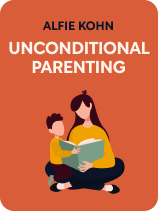

This article is an excerpt from the Shortform book guide to "Unconditional Parenting" by Alfie Kohn. Shortform has the world's best summaries and analyses of books you should be reading.
Like this article? Sign up for a free trial here .
What is conditional love parenting? How is conditional love parenting harmful to children? How can parents demonstrate unconditional love and acceptance?
In his book, Unconditional Parenting, author Alfie Kohn warns parents of the harmful effects conditional love parenting produces in children. Kohn believes the best way to raise happy, confident children is to show unconditional support by understanding your children’s perspectives.
Keep reading for Kohn’s explanation of conditional love parenting plus tips for unconditional parenting.
Conditional Love Parenting: What We’re Doing Wrong
What exactly are most parents doing wrong? In this article, we’ll look at the two faces of conditional love parenting, rewards and punishments, and Kohn’s reasons for wanting to get rid of them entirely.
Conditional Love Parenting Example #1: Rewards
According to Kohn, conditional love parenting is partly based on a system of rewarding “good” behavior (i.e. the behavior a parent wants from a child).
Here’s why Kohn says rewards don’t work:
1. They don’t build intrinsic motivation. Rewards tie behavior to external incentives, rather than allowing children to discover their own internal motivation. This means that when the reward disappears, the behavior will also disappear. In fact, Kohn points out that rewards even seem to decrease intrinsic motivation. For example, one study found that rewarding very young children for helping made them less likely to help later when no reward was available. Praise has the same negative effect.
2. They create pressure to succeed. Research shows that academic pressure can cause intense stress, which in turn leads to substance abuse, depression, and anxiety. Kohn argues that pressure to succeed is especially damaging in competitive situations, when one person’s success comes at the expense of someone else’s. In these situations, children are more likely to take shortcuts (for example, cheating on a test).
3. They can become addictive. This especially applies to praise. Kohn argues that if you praise children too much, they start needing to hear it constantly to feel good about themselves. This dynamic doesn’t allow them to develop the robust, stable self-esteem that they’ll need to be happy later on.
Conditional Love Parenting Example #2: Punishments
Kohn also claims conditional love parenting uses punishments to penalize children for “bad” behavior. This concept of “good” and “bad” behavior, and the system of rewards and punishments that springs up to reinforce it, entangles both parents and children so deeply that it can be hard to see alternatives. Kohn identifies several problems with these disciplinary systems, but the central one is that it creates a dynamic of conditional love parenting, where rewards and punishments make children feel that their parents’ love, approval, and affection are contingent on them behaving well.
According to Kohn, we shouldn’t use punishments with children because:
1. They don’t help the child to develop internal moral standards. Punishments don’t teach children to take responsibility for their behavior, repair relationships, or fix the problems they’ve caused.
2. They can be counterproductive: A child’s negative reaction to a punishment (for example, yelling or crying) might prompt the parent to punish more, locking both into a vicious cycle of punishments with increasing stakes.
3. They misdirect children’s attention, causing them to focus on the punishment itself and their anger about it rather than the problem behavior.
4. They cultivate either rebellion or over-compliance in the long term. Children whose parents rely on harsh punishments usually turn out in one of two ways: They stop questioning authority in a healthy way and end up completely disempowered, or they deliberately rebel. And in the case of rebellion, punishments simply encourage children to focus on not getting caught, rather than discouraging the behavior itself.
Rewards, punishments, bribes, and threats might “work” to achieve compliance in the short term, but in the long term they’re ineffective and often backfire. In fact, children whose parents don’t offer rewards and punishments are more likely to comply when their parents do ask them to do something. This effect even seems to kick in instantly—in one study, 3- and 4-year-old children whose mothers were told not to control their play during a short play session were more likely to comply with their mothers’ instructions immediately afterward.
How to Avoid Parenting With Conditional Love
Kohn emphasizes that unconditional parenting isn’t about the message you think you’re sending—it’s about the message the child is receiving. The fact that you love your child unconditionally is less important than how they feel. This doesn’t mean that you see everything your child does as perfect—but it does mean that no matter what he does, your highest priority should always be creating an emotionally safe environment. Body language, facial expressions, and gestures are key here.
Kohn points out that parents who are good at communicating unconditional love and acceptance in normal circumstances often fall down in situations of conflict, where it’s more important, not less, to make the child feel emotionally safe. This leads to adopting conditional love parenting techniques.
| Communicate Unconditional Acceptance: The Hand-Holding and “Time-In” Techniques As Kohn notes, body language is crucial when talking to children, especially when discussing behavior you’d like them to change. One aspect of body language is touch, which reduces kids’ cortisol levels and calms anxious children. You could try holding hands with your child during or after difficult conversations, which has been shown to improve communication and positive feelings in conflicts between adults (it hasn’t been tested yet with children). Instead of time-outs, Montessori-influenced educators recommend “time-ins.” To do a time-in, remove the child from the stressful situation and take him to a quiet place. Comfort him while he expresses his anger or frustration, help him put words to his emotions, and offer some techniques for managing the emotions (for example, taking deep breaths together). Then let the child choose whether or not he goes back into the situation. Janet Lansbury points out that this technique teaches the child that his parents are on his team and that they’re there to help rather than judge. |

———End of Preview———
Like what you just read? Read the rest of the world's best book summary and analysis of Alfie Kohn's "Unconditional Parenting" at Shortform .
Here's what you'll find in our full Unconditional Parenting summary :
- How to raise kids to be self-confident, independent, and compassionate
- Why you should throw away the standard parenting rulebook
- Why rewards and punishments cause more harm than good






